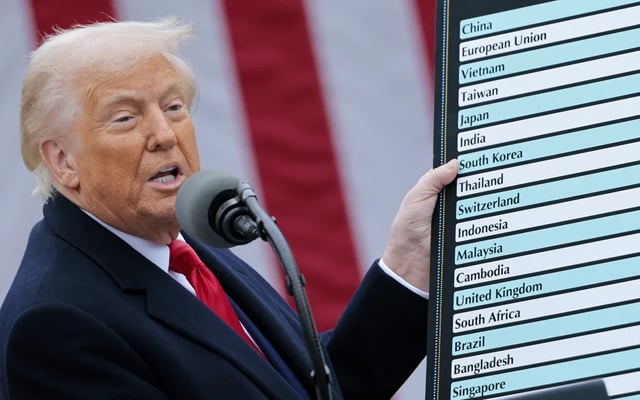News Flash


WASHINGTON, Aug 1, 2025 (AFP) - A range of new tariffs due to take effect in one week were announced Thursday on most US trading partners, with separate sector specific duties -- on copper -- also being implemented.
President Donald Trump unveiled an array of import levies that ranged as high as 41 percent on Syria and included a hike on Canadian imports from the current 25 percent to 35 percent.
AFP takes a look at the most recent developments:
- Canada -
Trump said Thursday the United States would raise tariffs on certain Canadian goods from 25 percent to 35 percent.
He had warned of trade consequences for Canada after Prime Minister Mark Carney announced plans to recognize a Palestinian state at the UN General Assembly in September.
"Wow! Canada has just announced that it is backing statehood for Palestine," Trump wrote on Truth Social.
"That will make it very hard for us to make a Trade Deal with them."
Unlike the new levies hitting dozens of other economies, there is no delay and these begin Friday, according to a White House fact sheet.
Products covered by the 2020 United States-Mexico-Canada Agreement -- which covers a wide swath of items -- will be exempt from the tariff rate.
- Mexico -
Trump said Thursday he would delay imposing higher tariffs on Mexican imports, pushing back their rollout by 90 days.
The decision came after he spoke with Mexican President Claudia Sheinbaum.
The US leader had originally threatened to raise tariffs on Mexican products from 25 percent to 30 percent come August 1, citing a lack of progress in flows of illicit fentanyl.
Goods entering the United States under the existing North American trade deal were spared.
- South Korea -
Just days before the tariff deadline, Washington and Seoul reached a deal to avert a 25 percent duty on South Korean goods, bringing the level down to 15 percent instead.
In making the announcement Wednesday, Trump said the country also committed to $350 billion in investments and to purchase $100 billion worth of liquefied natural gas (LNG) or other energy resources.
The 15 percent rate matches levels determined from US accords with Japan and the European Union.
Tariffs on automobiles will also stay at 15 percent, Seoul said.
- Brazil -
Trump's measures against Brazil are openly political, overriding long-standing trade ties.
He announced 50 percent tariffs on Brazilian goods, although delaying their imposition from August 1 to August 6 and exempting products like orange juice and civil aircraft.
The tariffs marked Trump's follow-through on threats to use American economic power to punish Brazil -- and Supreme Court Justice Alexandre de Moraes -- for what he has called a "witch hunt" against his far-right ally and former president Jair Bolsonaro.
- India -
Trump on Wednesday said Indian goods would face a 25 percent US tariff starting August 1, slightly below an earlier threatened level.
The country would also face an unspecified "penalty" over New Delhi's purchases of Russian weapons and energy, Trump said on social media.
"I don't care what India does with Russia. They can take their dead economies down together, for all I care," Trump added in a separate post.
- European Union -
EU exports to the United States are set to face tariffs of 15 percent on most products after both sides struck a deal to avoid a higher 30 percent level.
European Commission President Ursula von der Leyen said some agricultural products would be exempt under the agreement struck Sunday, though she did not specify which.
But France's President Emmanuel Macron pledged to be "firm" in follow-up talks.
"It's not the end of it," Macron told ministers during a cabinet meeting.